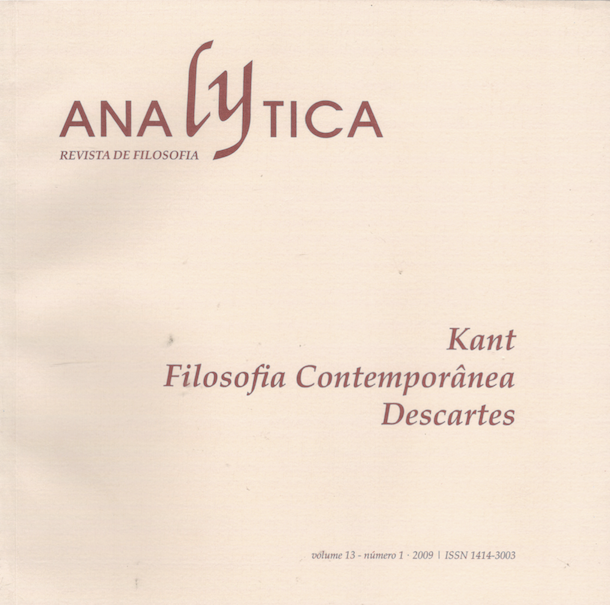“Eu julgo sobre muita coisa que não decido”: o problema da objetividade dos juízos em Kant
Resumo
Nos Prolegômenos, Kant baseia sua teoria do juízo na bem conhecida e igualmente polêmica distinção entre juízos de percepção e juízos de experiência. Como se sabe, apenas aos últimos se atribui validade objetiva e, consequentemente, determinação categorial. Por outro lado, no §19 da Dedução Transcendental das categorias do entendimento, segunda edição da Crítica da Razão Pura, atribui-se objetividade a todo juízo enquanto tal, sendo o conceito de juízo contraposto a unidades subjetivas. Para alguns, a posição refletida de Kant deve ser esta do §19 da Crítica. Estes consideram a distinção dos juízos em termos de subjetividade e objetividade, apresentada nos Prolegômenos (ironicamente nos seus §§ 18 e 19), um equívoco que apenas confunde o leitor. Para outros, a confusão quanto ao papel dos juízos na cognição dar-se-ia justamente na Crítica. Tendo como base uma análise dos §§ 18 e 19 desta obra, comparada a passagens de outros trabalhos de Kant, como os próprios §§ 18 e 19 dosProlegômenos, pretendo investigar então até que ponto e em que sentido poderia ser dito kantianamente que todo juízo é uma unidade objetiva de consciência.
Abstract
On Prolegomena to any Future Metaphysics, Kant based his theory of judgment on the controversial distinction between judgments of perception and judgments of experience. He ascribed objective validity (and, therefore, categorical determination) only to the last ones. On the other hand, on Transcendental Deduction of the pure concepts of understanding, §19, second edition of the Critique of Pure Reason, objectivity is ascribed to every judgment, so that the concept of judgment in itself is opposed to subjective unities. For some Kant scholars, the real Kant's thesis is on the §19 of the Critique. They believe that the distinction between objective and subjective judgments, on Prolegomena, is a mistake that just makes the reader confused. However, for other Kant scholars, the confusion about the role of judgments in cognition is on the Critique of Pure Reason. By analyzing §§ 18 and 19 of the Critique and comparing them with other Kant's works, like the Prolegomena, I intend to investigate if and how could it be said, in Kantian terms, that every judgment is an objective unity of consciousness.
Downloads
Publicado
Edição
Seção
Licença
Os autores que publicam nesta revista concordam com os seguintes termos:
- Os autores mantêm os direitos autorais e concedem à revista o direito de primeira publicação, com o trabalho simultaneamente licenciado sob a Licença Creative Commons Atribuição-SemDerivações 4.0 Internacional (CC BY-ND 4.0), que permite a redistribuição, comercial ou não comercial, desde que a obra original não seja modificada e que seja atribuído o crédito ao autor.
- Os autores têm autorização para assumir contratos adicionais separadamente para distribuição não-exclusiva da versão do trabalho publicada nesta revista (ex.: publicar em repositório institucional ou como capítulo de livro), com reconhecimento de autoria e publicação inicial nesta revista.
- Os autores têm permissão e são estimulados a publicar e distribuir seu trabalho online (ex.: em repositórios institucionais ou na sua página pessoal) a qualquer ponto antes ou durante o processo editorial, já que isso pode gerar alterações produtivas, bem como aumentar o impacto e a citação do trabalho publicado (Veja O Efeito do Acesso Livre).


